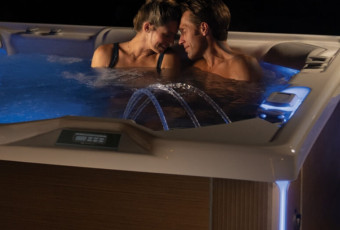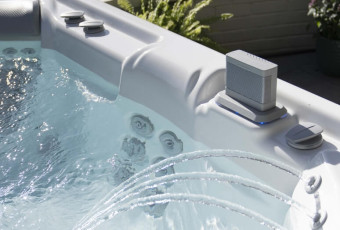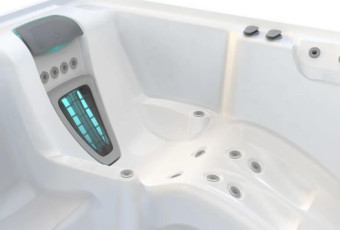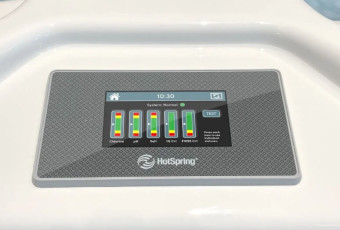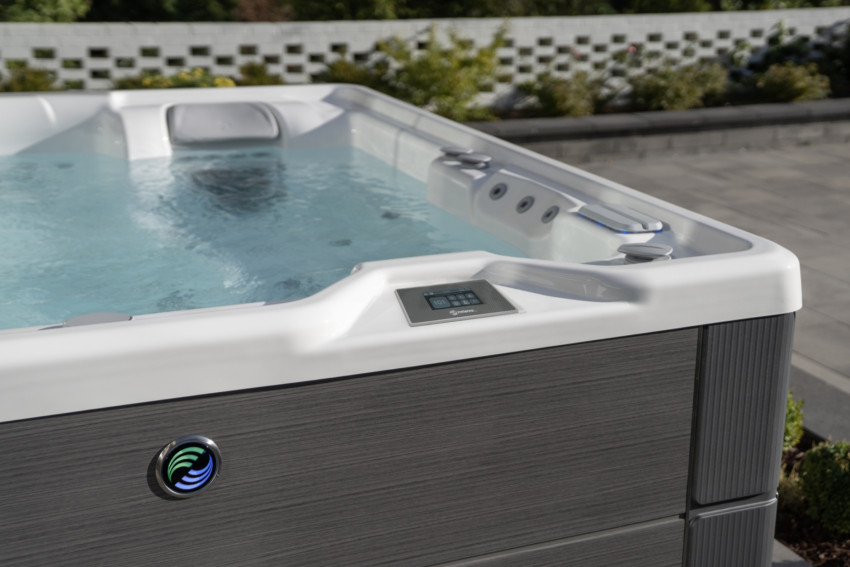Anxiety disorders are surprisingly common – approximately 15% of Aussies suffer from them at any one time, and one in four will experience anxiety at some stage of their lives. With such a large slice of the population looking for answers, one potential cure stands out. It involves pleasure and relaxation.

Study after study has shown spa pools to be an effective tool in lowering anxiety levels. The reasons are many and varied, from physiological effects like increased blood flow, to psychological effects like mentally separating yourself from sources of stress.
While humans have been using warm water immersion for millennia, recent spa pool innovations have dialled up its healing powers. In Hot Spring’s revolutionary jets, for example, you have jet streams that have been expertly crafted to deliver healing massage to specific muscle groups, and that can be customised to your preferred jet pressure – jet pressure capable of pumping five times the volume of spa jets on the market.
Why exactly is hot water immersion beneficial for reducing stress in your body? Read on to find out.
Are hot tubs good for your mental health?
A wealth of factors contribute to mental illness. Genetics, life experiences, medications, drugs and alcohol and psychosocial factors can all play their part. But some of the most important influences are physiological. Neurotransmitters like dopamine, serotonin and norepinephrine are key in regulating emotion and mood. If these chemicals are out of balance, an individual will be far more susceptible to anxiety, depression and other mental illnesses.
Nutrients and chemicals are carried to and around the brain by blood. This means that an increase in blood flow can help to deliver crucial nutrients and chemicals to where they’re needed most, thereby improving mood and mental health.
We’ve all experienced the initial shock then invigoration of cold water immersion. This is due to a process called vasoconstriction – peripheral blood vessels tighten up, directing fresh blood away from the body’s extremities and toward the brain and other vital organs. Warm water immersion has the opposite effect, but ultimately the same result. As blood vessels expand, the volume of blood pumped by your heart rises, feeding more throughout your entire body, including your brain. This is the effect of soaking in a spa pool.
As a device-free zone, a spa pool can also extract you and your children from the all-encompassing world of social media, which has been proven to have negative effects on mental health, particularly in young people.

How can soaking in a spa improve my wellness?
Anxiety is a complex disorder that is unique to the individual. So often what works for one person may not work for the other. With a spa pool soak – or ‘balneotherapy’, as the medical experts call it – you have one of the most universally effective treatments for anxiety and stress, thanks to the naturally healing properties of being immersed in warm water.
Why do so many of us dream of sinking into a warm bath or spa at the end of a long, stressful day? It’s because this deep desire comes from more than just the physiological effects described above. Warm water immersion relaxes your body in a wealth of more tangible ways:
- A warm bath can improve the amount of oxygen that is transported to your brain, resulting in clearer thinking.
- The temperature and pressure of the water on your body generates feelings of foetal comfort (like a liquid weighted blanket.)
- Research suggests the passive heating offered by warm water immersion can lower blood pressure, reduce the risk of heart attacks, and improve the body’s control over blood sugar levels.
A Hot Spring spa pool enhances these effects by adding a layer of revolutionary technology. One example: the Moto-Massage DX, the world’s first moving spa pool jet. This unique, fully adjustable stream sweeps up and down your back, massaging away stresses and strains.

Can a hot tub help with anxiety?
The awareness and understanding of mental health is improving, but depression, anxiety and other illnesses are still shrouded in a lot of mystery, making the search for answers difficult. According to science, spa pools offer a relaxing retreat to quieten the mind, while relieving tension and stress in the body.
One French study compared a leading selective serotonin reuptake inhibitor (SSRI) medication, a common treatment for anxiety, to balneotherapy (warm water immersion.) This randomised that treated 237 anxiety sufferers with either SSRI or balneotherapy over the course of eight weeks. The balneotherapy involved daily, bubbling, 37°C, 10-minute-long bath treatments in mineral-rich water, followed by a three-minute pressurised shower and a 10-minute massage.
Anxiety scores improved across both groups, but the results of the balneotherapy group were clearly superior, including long-term remission and sustained response. Unlike the medication, balneotherapy was also 100% side-effect-free.
The evidence is clear: spa pools offer an effective, scientifically proven and perfectly pleasurable way to manage the symptoms of mental illness.
How long should I sit in a hot tub?
The more time you spend in your spa pool, the greater the opportunity to enjoy its benefits. These benefits can increase with regular use. Exactly how often and how long should you soak?
In most relevant studies a daily, 10-15 minute soak will allow you to realise the mental and physical health benefits offered by a spa pool. If you choose a Hot Spring, you’ll add soothing hydromassage and SilentFlo circulation (no noise, more relaxation) to the long list of benefits that come with warm water immersion, while also giving yourself an isolated escape or a place for quality time with family and friends.
“It really doesn't get any better for a stress reliever at the end of a long day” – Anna Friend, Hot Spring customer.
All in all, a Hot Spring spa pool isn’t a home improvement product – it’s a self-improvement product, and one that you can experience for yourself today by booking a test soak!
Disclaimer: Hot Spring are not medical professionals, and the information above is not intended as a substitute for qualified and personalised medical advice. If you are experiencing health issues in any form, speak to a doctor to obtain a diagnosis and to decide on the most appropriate and effective treatment for your situation.
Love what you read? Join our Hot Spring Community and be the first to get the latest news and spa pool deals.

